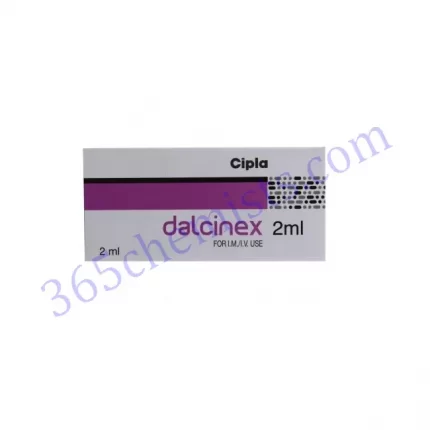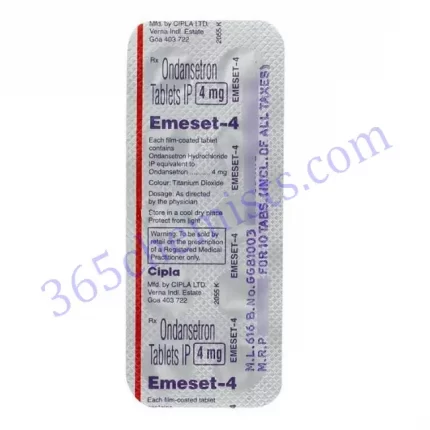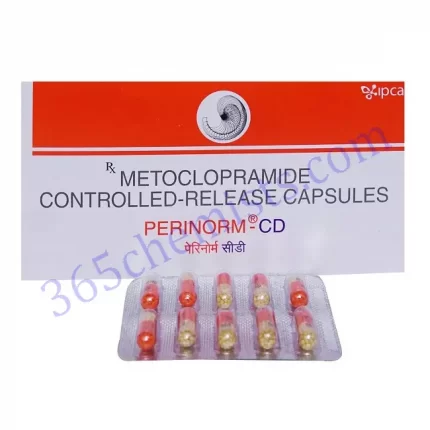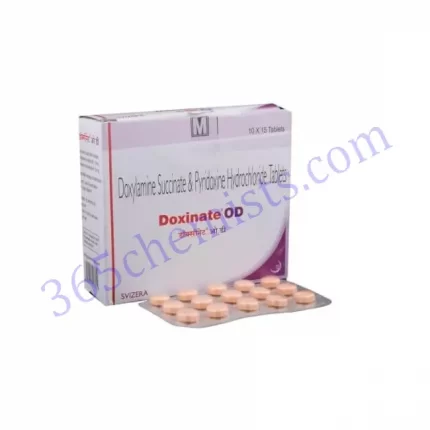Emeset Injection (Ondansetron 4mg):
Emeset 4mg Injection is a member of the antiemetics drug class and contains the active ingredient ondansetron. The primary purposes of this medication are to prevent and treat nausea and vomiting brought on by a variety of conditions, such as chemotherapy, radiation therapy, and post-operative recovery. This thorough overview aims to offer useful details about Emeset Injection, its applications, dosage, safety measures, and potential side effects.
Uses of Emeset Injection
- Nausea and vomiting brought on by chemotherapy: Emeset 4mg Injection is frequently prescribed to prevent and treat nausea and vomiting brought on by chemotherapy. It functions by obstructing specific body receptors that cause these symptoms, relieving the patient’s discomfort and enhancing general wellbeing in those receiving cancer treatment.
- Vomiting and Nausea Associated with Radiation Therapy: Emeset Injection is also useful in controlling nausea and vomiting brought on by radiation therapy. This symptom relief enables patients to receive radiation therapy more comfortably.
- Post-operative Nausea and Vomiting: Emeset Injection is utilised to both prevent and treat post-operative nausea and vomiting. It is frequently given beforehand to reduce the possibility of complications following surgery and to enhance patient comfort throughout the healing process.
Dosage and Administration
Health care professionals typically inject Emeset Injection intravenously or intramuscularly. Depending on the particular condition being treated as well as patient-specific factors, the dosage may change. It’s crucial to adhere to your healthcare provider’s or a product’s label’s instructions. Without consulting a doctor, never take more medication than is advised or change the way it is to be administered.
Related Product
Emeset 4mg Tablet
Emeset 8mg Tablet
Emeset 4 ODT Tablet
Emeset Injection 2ml
Emeset Injection 4ml
Emeset MD 4 Tablet
Precautions and Considerations
The following safety measures should be taken into account before using Emeset Injection:
- Ondansetron allergy: It’s important to avoid using Emeset 4mg Injection if you have a known allergy to Ondansetron or any other ingredient in it. From minor skin irritation to more serious reactions, allergic reactions can range. Use should be stopped right away if you exhibit any symptoms of an allergic reaction, including rash, itching, swelling, or trouble breathing.
- Emeset Injection should be administered with caution to people who have liver or kidney impairment. To ensure the medication is used safely and effectively, your healthcare provider might need to modify the dosage or carefully watch how you react to the medication.
- Emeset Injection’s safety during pregnancy and breast-feeding is still being thoroughly investigated. Before using this medication, go over the potential risks and benefits with your doctor if you are pregnant, trying to get pregnant, or nursing a baby.
Potential Side Effects
Although Emeset Injection is typically well tolerated, some side effects could occur. Headache, constipation, wooziness, and fatigue are examples of typical side effects. Usually transient, these side effects disappear on their own. It is important to let your doctor know if any side effects linger or start to bother you.
Allergies, an irregular heartbeat, and changes in vision are less frequent but potentially serious side effects. If you experience any severe or lingering side effects, it’s important to see a doctor.
Additional Information
When using Emeset Injection, keep the following additional considerations in mind:
- Healthcare Professionals Administering Emeset Injection: Healthcare professionals typically inject Emeset Injection intravenously or intramuscularly. It must be administered in accordance with the recommended dosage and under the guidance of qualified medical professionals.
- Drug interactions: Be sure to let your doctor know about all the prescription, over-the-counter, and herbal supplements you are currently taking. The effectiveness of Emeset Injection may be impacted by drug interactions, which may also raise the possibility of negative side effects. Your healthcare provider can evaluate potential interactions and, if necessary, modify your treatment plan.
- Special Populations: People with certain medical conditions, such as liver or kidney impairment, should use emmeset injection with caution. To ensure the medication is used safely and effectively in these circumstances, dosage adjustments may be required.
- Emeset Injection should be stored according to the manufacturer’s or a doctor’s instructions. For the proper disposal of unused or expired medication, adhere to local regulations.
- Emeset Injection may make you feel sleepy or dizzy. Avoid engaging in tasks that call for mental clarity, such as operating machinery or a vehicle, until you are familiar with how the medication affects you.
- Reporting Adverse Effects: Inform your healthcare provider or your local regulatory authorities if you experience any severe or unexpected side effects while using Emeset Injection. This data contributes to ongoing safety profile monitoring and helps ensure the medication’s safe use.
- Keep in mind that the information presented here should only be used as a general reference and not as a substitute for specific medical advice. Always speak with your healthcare provider to get specific advice based on your unique needs and situation.
Conclusion
An effective treatment for nausea and vomiting related to chemotherapy, radiation therapy, and post-operative recovery is Emeset Injection (Ondansetron 4mg). It assists in reducing these symptoms by blocking specific body receptors, enhancing the general wellbeing of people undergoing treatment or recuperating from surgery. For safe and efficient use of Emeset Injection, it’s crucial to stick to the recommended dosage, take the necessary precautions, and pay attention to how you react to it. Consult your healthcare provider for specific advice and direction if you have any worries or questions about using Emeset Injection. Throughout the course of your treatment, maintaining regular contact and following up with your doctor will help to ensure the best possible outcomes for controlling nausea and vomiting.












